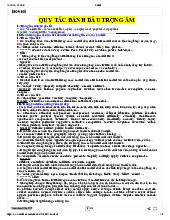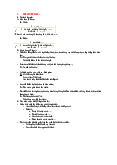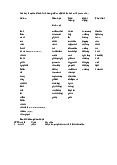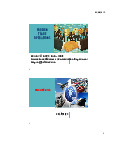



Preview text:
BÀI TẬP LISTENING- SPEAKING TUẦN 9 Unit 7: Travel
Working with words | Air travel
1. Here are some of the things that air travellers complain about. Which ones do you hear most often?
- Long waits at the airport is one of the most complain that I often hear about that.
- Because of flight delays due to bad weather or technical problems often occur and last for several hours.
2. Read the text and complete the headings with the words in 1. 1) Uncomfortable seats 2) Additional costs 3) Long waits at the airport 4) Other passengers
3.Discuss these questions with a partner.
1)Which aspects of air travel do you find annoying? What about other forms of travel?
- The aspects of air travel that I find anooying are:
+ Customer service staff is not good
+ The additional costs are too high
+ Transit is disadvantages because Vietnam do not have direct flights -The forms of travel + Go backpacking by motorbike +By Subway +By Bus +By Train +By Tram +By Coach +By Boat +By Ferry
2) Do you ever complain to airlines or other travel operators? Why/Why not?
- I have never complained to the airlines or because most of the flights I took
were very good, there were only small errors but they fixed that. Therefore I feel
very comfortable when I were experiencing flights
3) Do you think airlines or other travel operators respond well to complaints? Why/Why not?
- Yes, I do. I think they will accept passenger feedback and respond well to
complaints. Because they fear passagers don't trust them and the passagers don't
want to experience their flights.
4.Match the words in bold in the text in 2 to definitions 1-10
1) The reason it’s not possible to take a heavy bag – baggage allowances
2) A change to a more expensive seat - a seat upgrade
3) When your plane is late leaving – delayed flight
4) You might sit here to have a little more space – aisle seat
5) Bags that you put above or under your seat – hand baggage
6) When you get your fight document from a machine – security scans
7) The maximum number of suitcases you can take – weight restrictions
8) When you pay more for services before or during your flight – self-service check-in
9) They do this at airports to protect passengers – airline charges
10) When your second plane leaves before the first one arrives – missed connections 6.
Listen to conversations 1-3. Which passenger…? 7.1
a) will have to pay more – 3
b) made a mistake at check-in – 2 c) will arrive late – 1
7. Cross out the world in each group that can’t combine with the word in bold. Then
compare your answer with a partner.
1) middle/ hand/ window – seat
2) online/ priority/ passport – check-in
3) free / First Class/ electronic – upgrade
4) excess / hold / seat - baggage
5) connecting / airport / cancelled – flight
6) additional / delayed / extra – charges 8.
Listen again. Which compound words from 7 do you hear? 7.1 With a partner, use the
word combinations to describe each situations.
- The words that I hear in 7 are : + free upgrade, First Class + hold baggage, secury scans + window seat
-The first situation : The madam had a meeting in Stockholm and she missed her flight.
The staff offered her another flight with the condition of a free seat upgrade
-The second situation: David booked 4 airline tickets online but when he got to the
check-in counter he only booked 3 tickets and he wanted his wife and children to go
through security but the staff asked him to go back and explain to the processing department.
-The third situation: Her luggage was 23kg over the allowed limit and her suitcase
weighed 28kg so she had to pay an extra 75$ and she wanted a window seat but her ticket
didn't qualify and she thought it was a bad day for her
Language at work | will/going to/present continuous
4. Complete explainations 1-3 in the Language point with wil, going to or present
continuous. Then match the sentences in3 to each explaination LANGUAGE POINT
1.We use going to to talk about a plan that’s already decided
Example:Jessica is going to buy Iphone 15 Promax in next month
2.We use present continuous to make a decision at the moment of speaking
Example: I am having a party with friends this weekend
3.We use will for an arrangement with a fixed time or place.(You can often use going to here instead)
Example: I’ll go supermarket to buy somethings
7. Your boss Meghan is on a business trip this week. You receive this email from her.
Choose the correct words in italics.
Arianna Boyle from TFF is going to visit us next Wednesday. It’s her first time here and
she’s a very important customer.
Unfortunately, I’m only free to see her for part of the day. She will arriving very early in
the morning on a night flight, spending Wednesday night in a hotel near the company and
she is leaving on Thursday. Can you meet her at the airport and decide what you will do
with her during the day: restaurant, local visits, etc..? There’s a provisional schedule on my desk. Can you complete it?
There’s also an email from Arianna. I’m calling you tomorrow morning to check that everything’s ok. Meghan
Business communication | Arranging to meet 2.
Fabrizio calls Emily in Montreal to arrange a time to meet duri 7.4 ng his visit. Listen and make notes on:
1. Why Sunday and Tuesday aren’t possible
- Answer: Bacause Emily is staying Montrewal until Wednesday.
2. What day,time and place they decide
-Answer:They decide to meet on Wednesday at lunchtime and the place where they meet is the conference centre. 3.
Listen again and complete sentences 1-10 7.4
1) When can we meet? Are you free that evening?
2) I have a meeting there on Monday. Can we find a different time?
3) I’m staying in Montreal until Wednesday. When would suit you?
4) I’m coming back on Monday evening. What about have lunch on Tuesday?
5) What’s your availability later in the day?
6) How about Tuesday evening instead?
7) I’m afraid I’ve got something on that evening.
8) In that case, does Wednesday lunchtime for you ? 9) Great.
on outside the conference centre. That suits me
10) The morning session finishes at one. Shall we say one fifteen?




